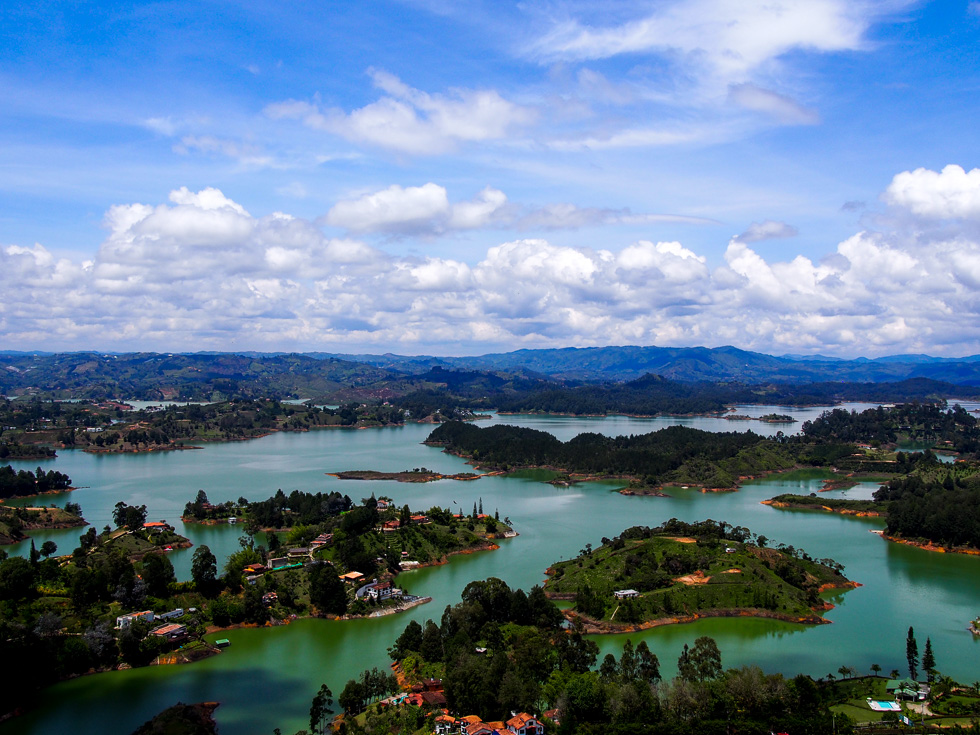
Travel can lead us to some amazing areas of natural beauty around the world… this one in particular is Guatapé, Colombia and its beautiful lakes!
We all know that travel can be transformative, awe-inspiring, and expose us to amazing sights, sounds, and experiences around the globe. However, one of the dirty and (not so) little secrets of travel is that mass tourism has the potential to be really environmentally destructive. Luckily, though, there are many ways that we travelers can move through the world in more responsible ways, to decrease our carbon footprints and travel sustainably. If you love to travel and you’re also concerned about the planet, look no further – I’ve got plenty of eco-friendly/green travel tips for you.
This is a post about sustainable travel, but keep in mind that sustainable travel is a multi-faceted term that encompasses not just the physical environment, but the social and economic realms as well (for example, I share some socially responsible travel tips in my post Is Travel Exploitative? 9 Tips For Responsible Travel and I talk about the intersections of the environment, the economy, and human rights in travel in my post about how travelers can combat overtourism). In this post, I specifically list eco-friendly travel tips that address the environmental side of the sustainable travel puzzle. I also address environmental justice and its relationship to travel, understanding that marginalized folks around the world are disproportionately affected by environmental issues, such as from contamination or pollutants in the air, water, and soil. Considering the environmental impacts of travel and the fact that travelers are generally some of the world’s most privileged people, I believe it is important to consider how our travels impact not only the Earth as a whole, but also the local environment of a place, which in turn affects the people living there.
With that in mind, here are some green travel tips for the environmentally conscious traveler.
Begin with education
Responsible travel starts with education, which can (and should) begin before you leave for your trip. Read up on your travel destination to familiarize yourself with the basics about the language, culture, history, and geopolitics. Read the news from your travel destination – if there are environmental concerns in the place you’re visiting, you will want to know about it before you go (local news sources are a good place to check for any environmental issues). This knowledge will better prepare you for how to interact with the place that you visit, in terms of what to be mindful of and how much of any given resources you should consume. This is particularly important when a place is facing a challenging environmental issue, such as a drought or food scarcity.
In addition, one way to support environmental justice initiatives while traveling is to research, read, and follow local environmental activists in the place you will be visiting. Google and Twitter are great resources for finding local grassroots environmental organizations around the world. Reading up on any grassroots activism can help you better understand which issues are most pressing in the places you will visit. It can also help you to be mindful of any potential resource scarcity, and let you know which groups and products to support (or boycott) in solidarity to the movements, and more.
Reduce air travel
Air travel, while convenient, is particularly detrimental to the environment compared to other forms of transportation. It outputs more carbon dioxide (and other greenhouse gases) into the atmosphere than cars, buses, and trains, per passenger-kilometer. For folks who like to travel internationally, reducing air travel can be tricky. However, there are a few things that one can do to reduce the environmental impacts from flying.
Greenhouse gas emissions from flying are greater during takeoff and landing than while cruising in the air. So for folks who must fly but are looking for more eco-friendly travel options, try taking direct flights, which contribute less carbon pollution than flights with layovers (plus, it’s faster and usually more pleasant to fly direct, so it’s a win-win!). Also, if you’re traveling shorter distances, look into other public transportation options, such as buses, trains, and/or rideshares. Flying first class is also less efficient than flying economy class, because the space required for the first class jumbo-sized seats could fit more passengers (which would in term make the aircraft more efficient per passenger). Here is a calculator that you can use to check the carbon dioxide emissions from your flight(s).
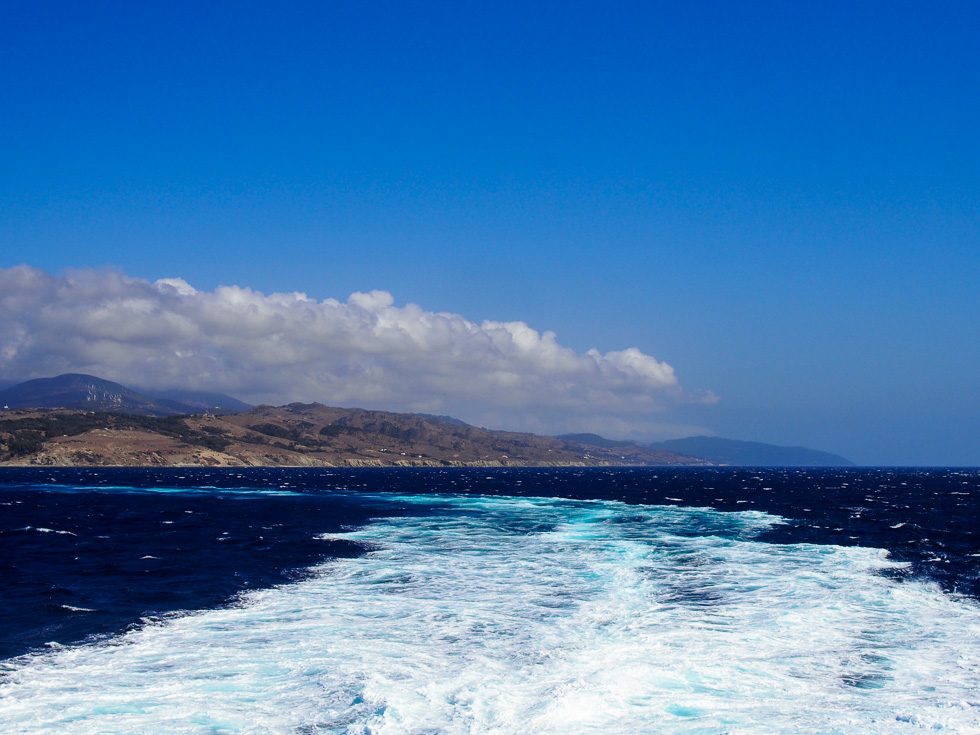
Instead of flying from Spain to Morocco I traveled overland… by boat! Here’s a view of the last glimpses of Spain from the ferry.
Purchase carbon offsets
One simple way to travel greener and counteract the significant carbon footprint from travel is by purchasing carbon offsets. Carbon offsets are an investment in an environmentally friendly program, which purportedly “cancels out” the negative environmental impact of one’s actions. It is increasingly common for people to purchase carbon offsets with a flight, for example, to compensate for the carbon pollution caused by air travel.
Carbon offsets can be beneficial, though it’s important to take great care in the purchase of offsets to make sure that the money is going to programs that actually reduce emissions. The NRDC has a great article about the importance of verifying that the purchase of carbon offsets are real, strictly enforced, and permanent environmental solutions. While carbon offsets are a tangible measure that travelers can take to reduce their carbon footprint, it’s also important to consider how we can directly reduce our carbon footprint before the purchase of offsets, through means such as overland travel, local travel, and simply flying less.
Pack a “green” suitcase
One simple eco-friendly travel tip? Pack a zero waste suitcase. For example, on every trip I pack a reusable water bottle (which is imperative because the environmental impacts of disposable water bottles are enormous), reusable shopping bags for grocery shopping and going to the market, sustainable menstrual products (perfect for the traveling menstruator – don’t miss my guide to all of these sustainable options), and tupperware for food leftovers. There are so many simple products that you can bring with you for eco-friendly travel, and this just scratches the surface. You can also bring solar powered battery chargers, biodegradable sunscreen, reusable ziplock bags, a water bottle with a filter or a Steripen to sanitize unsafe tap water… Don’t miss my in-depth post about zero-waste travel, complete with all sorts of green packing tips for a trash-free trip!
Choose eco-friendly accommodations
Look for hotels, hostels, guesthouses, etc., that make sustainability a priority. Do your research before booking – simple Google searches for eco-friendly accommodations can be a good starting point, though you can also try booking services such as ecobnb.com and environmentallyfriendlyhotels.com. Find out before booking if the hotel/hostel/b&b that you’re interested in supports recycling or compost projects, if they get energy from renewable sources, if they utilize water-saving devices, etc. Also, booking eco-friendly accommodations does not have to break the bank; there are many green hostels and other budget-friendly green places that cater more towards a backpacker budget.
One amazing eco-friendly hostel that I stayed at during my travels is Bulungula Lodge in Transkei, located in South Africa’s Eastern Cape. It’s 100% community-owned by the residents of the surrounding Nquileni Village. The lodge runs entirely on solar power and there are a number of other sustainable initiatives throughout, including the ongoing education of locals and visitors about sustainability and environmentalism. Plus, it’s a beautiful place to visit. A bed in a dorm room at Bulungula costs R190 (about 16 USD at the time of this post) – a prime example that you don’t have to shell out hundreds of dollars a night at a boutique eco-hotel to support sustainable accommodations.
Finally, if you’re looking for an environmentally friendly (and socially responsible) place to stay, I would advise you not to stay at an all-inclusive resort. All-inclusives are notorious for worker exploitation and actually taking tourist dollars away from locals (because what incentive is there for guests to venture off the resort’s property and pay for local services when the hotel already provides everything?). Environmentally, all-inclusives pose all sorts of other problems: excess consumption of water and electricity, absurd amounts of food waste, and an appropriation of land that could otherwise be utilized by locals or for other more sustainable initiatives. Folks looking to stay at all-inclusives should do a lot of research to try to find one that addresses these environmental and human rights issues before booking.

View of the sunrise from Bulungula Lodge in Transkei, Eastern Cape, South Africa
Support local and avoid gentrifying
One incredibly important aspect of sustainable travel is supporting local businesses: accommodations, restaurants, shops, events, spaces, and more. Supporting local is good for the local economy because it keeps money within the community you are trying to support (as opposed to sending it out of town or overseas). Buying local food and goods means that your purchase has not had to travel long distances to reach you, which reduces demand on air travel and creates less waste due to packaging.
Buying fresh, local food also decreases food waste due to transportation, as food that travels long distances is more likely to be damaged or inedible due to a lack of adequate storage conditions during transit. Food waste itself is also a significant source of greenhouse gas emissions, between the energy costs associated with preparing and transporting food that ultimately goes to waste, to the emissions associated with decaying food in landfills, to the land use changes (such as deforestation) required in creating agricultural space. When traveling, not only should you buy local food, but also be mindful to only buy as much as you need, and if you have leftovers save them for later, give them away to someone who is hungry, or compost them if possible (see if your hotel or hostel has a compost heap!).
Additionally, tourists should be mindful of the potential gentrifying effects of their presence around the world. Tourism can drive up the cost of living in a neighborhood, prohibiting locals from having the same access to parts of their communities that they once had. This effects local businesses, which then have to compete with wealthier, oftentimes foreign-owned corporations for prime real estate. Travelers, in addition to supporting locally owned businesses, should be careful about price-driving accommodations such as AirBnb, which can contribute to the forced displacement of locals in cities around the world.
Try ecotourism activities
Eco-friendly travelers should definitely try ecotourism, which refers specifically to tourism that has a sustainable focus, and is meant to function as an alternative to mass tourism and its environmental issues. Ecotourism generally focuses on conservation and environmental stewardship, as well as the preservation of natural areas and local cultures. Ecotourism might include visiting an animal sanctuary dedicated to protecting wildlife, or taking a tour through a nature reserve that focuses on conservation of the local flora and fauna. Ecotourism activities are a good way to enjoy nature while ensuring that your presence does not have a negative impact on the local environment.

Orchids seen in Orquigonia, a nature sanctuary dedicated to the rescue and conservation of orchids and other native plants, in Cobán, Guatemala
Rethink cruising
Cruise tourism is rife with human rights issues, and cruising can be very detrimental to the environment. Exhaust from cruise ships pollutes the air (and is a hazard to human health). Additionally, cruise ships produce numerous waste streams, such as sewage, bilge water (which contains oil and other contaminants), graywater, and solid waste (such as food waste). Sometimes this waste makes it back to land… and sometimes it’s dumped illegally in the ocean. Friends of the Earth releases a report card rating different cruise lines on their environmental practices; if you decide to book a cruise I would advise you to check their report card first and choose the most eco-friendly and human rights-friendly option.
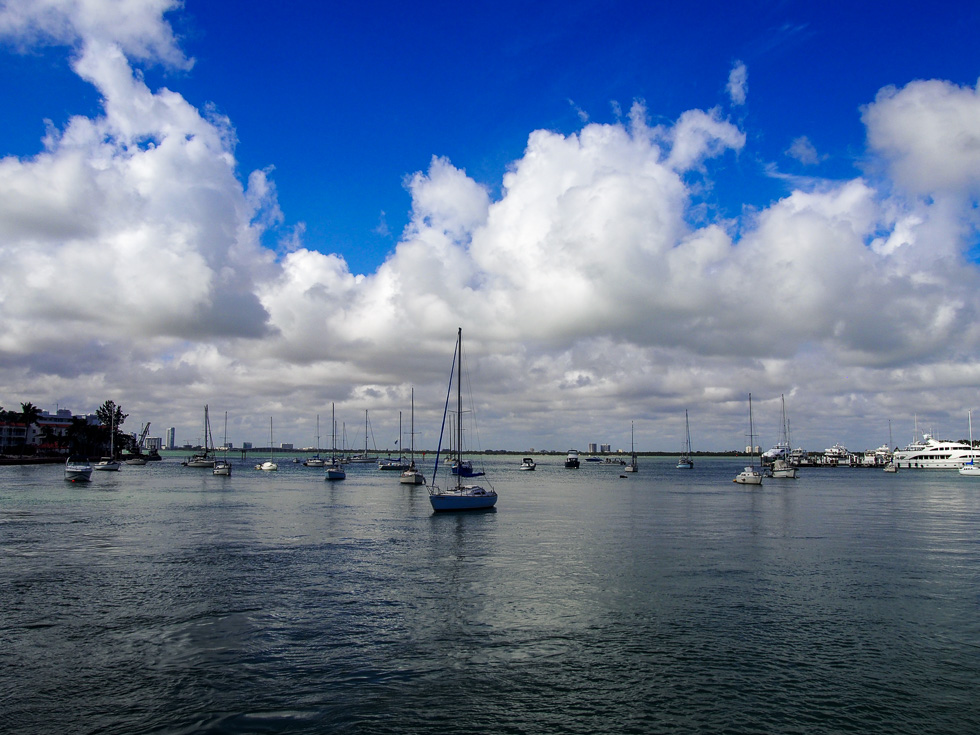
Maybe go sailing instead of cruising? It’s hard to get more eco-friendly than wind power!
Be prepared to make sacrifices
Eco-friendly travel that considers environmental justice around the world means being prepared to make sacrifices about what you do, where you go, and how you spend your money. Tourists tend to have the luxury to indulge in whatever they want while traveling, but this doesn’t necessarily support the communities we’re visiting in sustainable ways. For example, have you always wanted to travel to a specific natural area, but the government is forcibly evicting Indigenous folks who have historically lived on and conserved that land? Don’t go. Your money and what you do (or don’t do) with it speaks volumes.
As a traveler, if you’re not prepared to sustainably interact with a region’s resources, then you should consider traveling somewhere else. Also, if a region is dealing with the aftermath of a natural disaster such as a hurricane or earthquake, now is not the time to travel to that place! To best aid regions recovering from disasters, donate directly to local development and relief organizations (and see below!).
Donate
One of the best ways to support environmental initiatives around the globe is by directly donating to grassroots organizations working to protect the land and resources that you visit and utilize during your travels. Local NGOs and nonprofits, especially when they are community run, have the greatest knowledge of the needs of the community. Look them up (try Google, Twitter, or even word-of-mouth) and give directly.
Leave no trace
Remember that when traveling, you are a guest in someone else’s home and must play by house rules. Consume conscientiously, understanding the limitations of the place you are visiting. Don’t litter, and pick up after yourself and your fellow tourists. Recycle whenever possible. Work to create as little waste as possible. And remember that as a tourist, you have the luxury of leaving a place at the end of your trip. Any environmental damage caused by travelers will be left to the locals to sort out and live with every day. Don’t be that person. With work, empathy, and a listening ear, we can be responsible, eco-friendly, and environmentally conscious travelers.
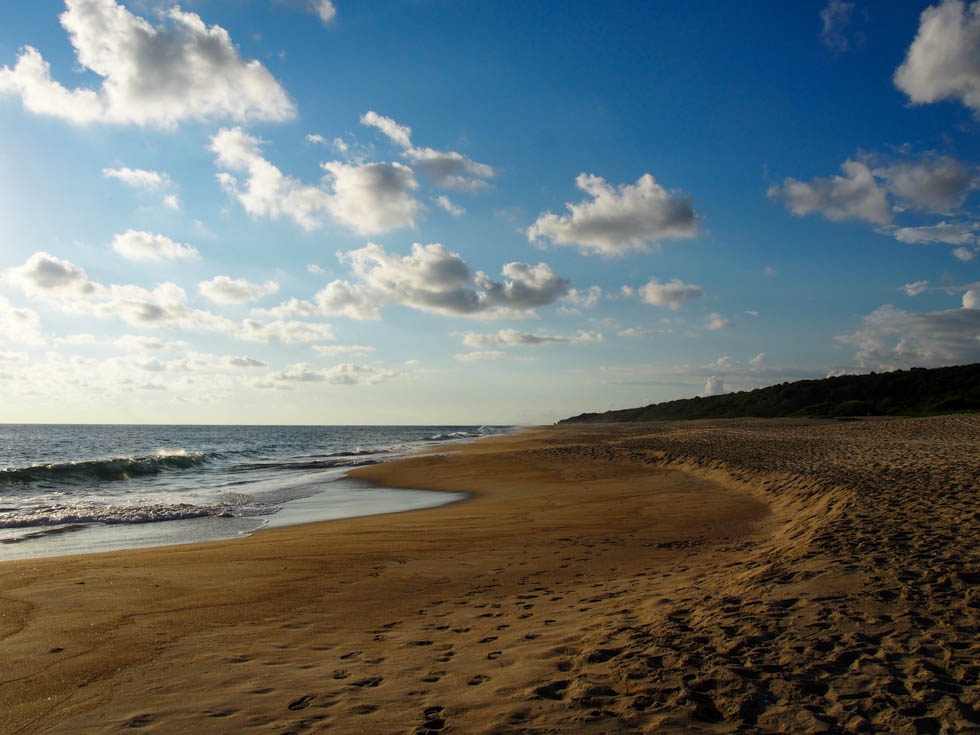
Tranquil Playa Bacocho in Puerto Escondido, Mexico… pristine beaches like this one will only remain pristine if we all do our part to take care of them!
What are some steps that you take when traveling to ensure that your global adventures are eco-friendly and overall sustainable? Is eco-friendly travel a priority for you? What you do find most challenging about sustainable travel? Is there anything you would suggest that I add to this list?
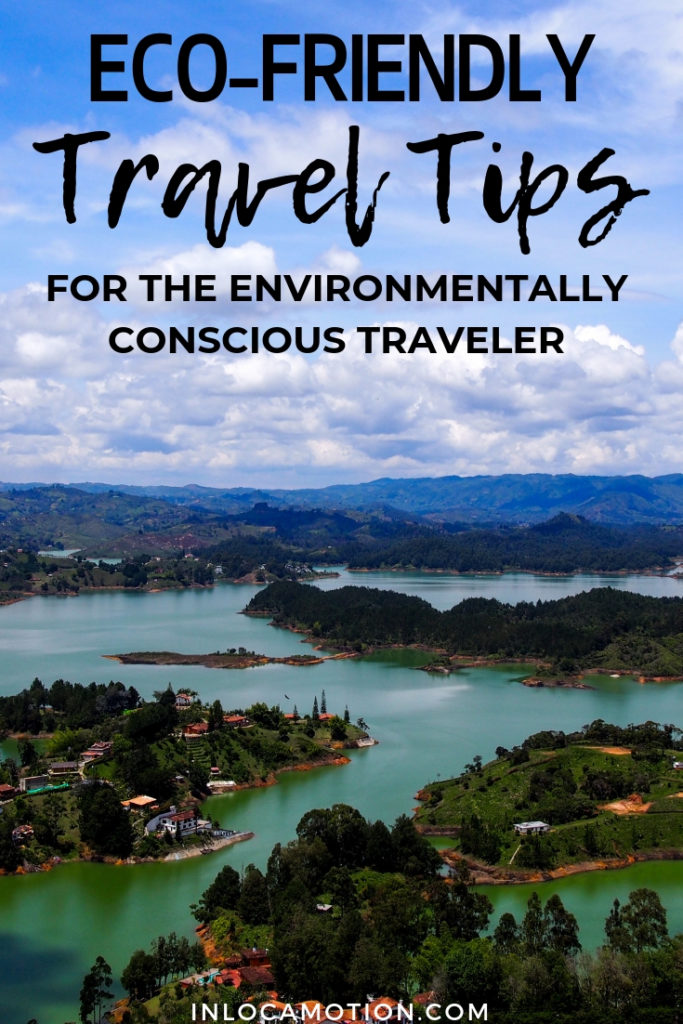









24 comments
Mass tourism is something that I’ve grappled with myself as someone trying to travel sustainably… Often I feel like there is no way to travel without causing *some* detriment to the host country… But it’s good to read ways that I can minimize negative effects so that the positives may outweigh the negatives. I love that you state education. I do this out of an intuitive sense of duty to have a richer experience… but it’s also out of having some basic respect for the people around me who I’ve come to visit… Great points! I’m inspired. Thanks for sharing.
I totally get what you’re saying about the conflict of wanting to travel while understanding the negative impacts of tourism. It’s a fine balance, and unfortunately in this very imperfect world it’s impossible for any action to be “pure” and free of some sort of harm. So I try to frame it from a “harm reduction” perspective instead, i.e. understanding that there are always going to be consequences to our actions, what can we do to minimize the negative impacts and maximize the positive? Sounds like that’s where you’re starting from, and I think it’s a productive point of view. I’m glad to hear that you enjoyed the article. Thank you for reading and commenting, Isabelle!
I can’t believe I didn’t know some of these things. I never knew cruises caused so much pollution or the issues with air travel. I’m definitely going to adopt these practices and thank you for sharing. It’s so important that we don’t damage the amazing places that have welcomed us.
I’m so glad to hear that you found the article useful! Best of luck with greening your travels. Thank you for reading and commenting, Diamond 🙂
This is a good primer. Just want to add a caveat on the Education advice though. Just bear in mind that resources on the internet are good for destinations that are English speaking, or otherwise with a strong presence of your own language on the internet on these issues. Otherwise, the information you get can be heavily tilted towards the lens of urban demographics who have the main access and are local content creators online in English, but who are usually detached from their own rural populations, heavily westernised, and whose views are often very theoretical since they don’t actually live close to nature. This is quite different from say, Europeans or north Americans or Australians, many of whom still maintain wilderness and outdoor living skills as part of your normal culture, even though living mainly an urbanised existence.
This is especially the case in regions where there is a high inequality between urban and non-urban populations (Asia definitely). Even more so where native culture is very subtle in communication style and see little need to speak openly and loudly about their points of view, and you are supposed to notice things like the meaning of silences and changes of topic as answers in themselves (again, much of Asia). My advice for such destinations is to still learn something beforehand, but complete the education when already there.
The exceptions are NGOs and groups who are longstanding, and are present *inside* the communities local to the destination, because these cannot practically long remain there without demonstrating they understand life and issues to the local community.
Teja, thank you so much for bringing up this very important point! I think it’s very necessary to keep in mind the lens of the reporter, especially when there are language differences and demographic differences at play. Ideally, the education component would consist of mostly primary sources, interviews, and local news stories, but that’s not always possible, especially if there’s a language gap. It’s for this reason (and many others!) that I much prefer traveling in countries where I speak the language, and in my information gathering I can go right to the source. I also really appreciate that you brought up some of the more subtle and non-verbal aspects of communication in certain communities in Asia and how that could affect the education piece. It’s good advice to take all of this into account, to do our best to educate ourselves beforehand but also understand that there is so much to expand upon once arriving at a place. Thank you for broadening my perspective and for taking the time to leave this insightful comment!
Super interesting post and Lois of great action points. A friend has asked me to join her on a cruise next year and ill definitely read up about of more! The only thing I’d add is that it can actually also really important to travel to a country after a natural catastrophe or incident. I remember when there was the big earthquake in Ecuador in 2016, the country list a lot of its income from tourism because visitors were scared to visit, even though the main touristy areaswe’re completely unaffected. I think it depends on the circumstances of each case, and it’s important to do your research before you cancel a trip in haste.
Hi Kathi! I’m glad that you liked the post, and good for you for thinking more about cruising. To address your comment about post-disaster tourism… I think it really depends, but here I’m mostly referring to (not) traveling to the specific area where the disaster occurred. If other parts of a country or region are unaffected by the disaster then I don’t see it as a problem to travel to those other regions, but there has become a kind of “disaster tourism” business that occurs after big events like hurricanes, tsunamis, etc that – surprise, surprise – takes much needed resources and aid away from those most affected by the tragedies and puts those resources towards tourism. So that’s what I think we need to be especially careful of. Bani Amor wrote a great article about it which goes into much more depth if you’re curious: https://www.bitchmedia.org/article/vacation-not-activism/tourism-and-ecosocial-disasters
Thank you for reading and commenting!
Loved every word of this! We also try to travel as sustainably & ethically as possible. Cruise ships are kind of my nightmare anyway, but we opted for a private sailboat with a group of friends in the Bahamas recently and it was sooo much more fun, better for the environment, and really not much more expensive. There are so many great options for ethical travel if folks take the time to look!
Wow, sailing around the Bahamas sounds so lovely! Thanks for the positive feedback, Emily 🙂
These are some really useful tips! I’ve never thought of taking my own shopping bag for things I buy whilst away. Also, I had no idea how bad cruising was for the environment!
Yeah, it’s such a simple thing to throw in your bag but it’s soooo helpful. I travel with one that folds up really small, but when open is actually big enough to double as a carry on bag for me. It’s perfect! Thanks for reading and commenting, Tasha!
This was a very well written and thorough article. My home city of Cape Town is suffering the negative effects of mass tourism and the gentrification of local neighborhoods. Every blogger who visits Cape Town these days has a photo of Bo Kaap, and when I visited there myself a few months ago I could not believe how much it has changed. Gone are the neighborhood cafes, replaced by hipster coffee roasteries and artisanal this and that shops. Gone are many of the original residents, replaced by wealthy foreign property owners who have purchased the colorful homes to take advantage of the burgeoning AirBnb market. The soul of the Bo Kaap is gone, replaced by bus loads of tourists looking for an insta worthy photo op and trinket vendors on the road side.
Hi Razena. Thank you so much for leaving this thoughtful comment and sharing your observations about the gentrification of Bo Kaap. It is so saddening to hear about this – and a big reason why I don’t use AirBnb, though obviously more (policy) measures need to be taken to combat gentrification. It’s such a pervasive problem around the world, and important that it comes up more and more in the travel sphere. Thank you for reading and commenting.
“Leave no trace” I love this line. Words cannot express how much I want to tell this to tourists who visits spots here in the Philippines. One of our main tourist destinations, Boracay, is now forced shutdown by the government because of the pollution left behind by the many tourists, both local and international, has left. Making memories and leaving thrash is not the way to go. I will definitely share this to all my media channels.
Thank you for your supportive comment, Erika. It’s such a shame about Boracay – as travelers, we really have a responsibility to be mindful of overtourism and how destructive it can be. Thanks for reading and for sharing this example.
This was such a wonderful, helpful article. I particularly liked that you emphasized the importance of educating ourselves (not just expecting the locals to do it for us)! Maybe it’s because my mom is a teacher, but I truly believe that education is the key to solving most of the world’s problems–if we’re educated in why something is a problem, we can’t help but want to help. I also really appreciated what you said about gentrification; I live in the San Francisco Bay Area, and gentrification (as well as pollution) has become a huge problem for us. Thank you for your thoughtful words!
Kris, thank you for your thoughtful comment! I so agree with your thoughts on education – it’s fundamental to our advancing as a society, and ignorance is a huge factor in how we remain stuck in vicious cycles. I appreciate you taking the time to share your thoughts, and I’m glad you found the article helpful!
Wow, your article on how to make traveling more environmentally just and sustainable really impressed me for suggesting travelers cut on air travel, which is heavy on carbon footprint. Ouch! The good thing is, you suggested could that jetsetters fly but make sure to invest in carbon offsets, or environmentally friend advocacy programs. Guilt as charged, I would definitely search for these programs and start donating pronto.
Thanks for your supportive comment, Angel! I really appreciate it. Happy (green) adventuring!
A great message and tips for people during their travel and it would be very helpful and would have a great impact on our environment. Good post, Alissa, keep on sharing these informative articles.
Thanks so much, Timmy! I’m really glad you found the post helpful 🙂
There have always been two sides of the same coin. While tourism boost economy, it also impacts the environment. Maintaining a balance between these two vital aspects is very important to let the money flow in and keep the environment from getting polluted. I hope travelers can take a lesson from your experience and imbibe the core message of this post.
Thank you for your remarks and your positive feedback, Chetan! I definitely agree that we’re in desperate need of a balance in the travel industry. Thank you for reading and commenting 🙂